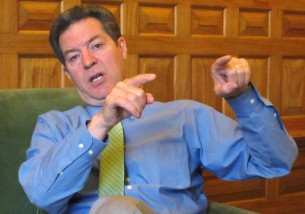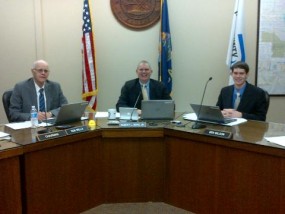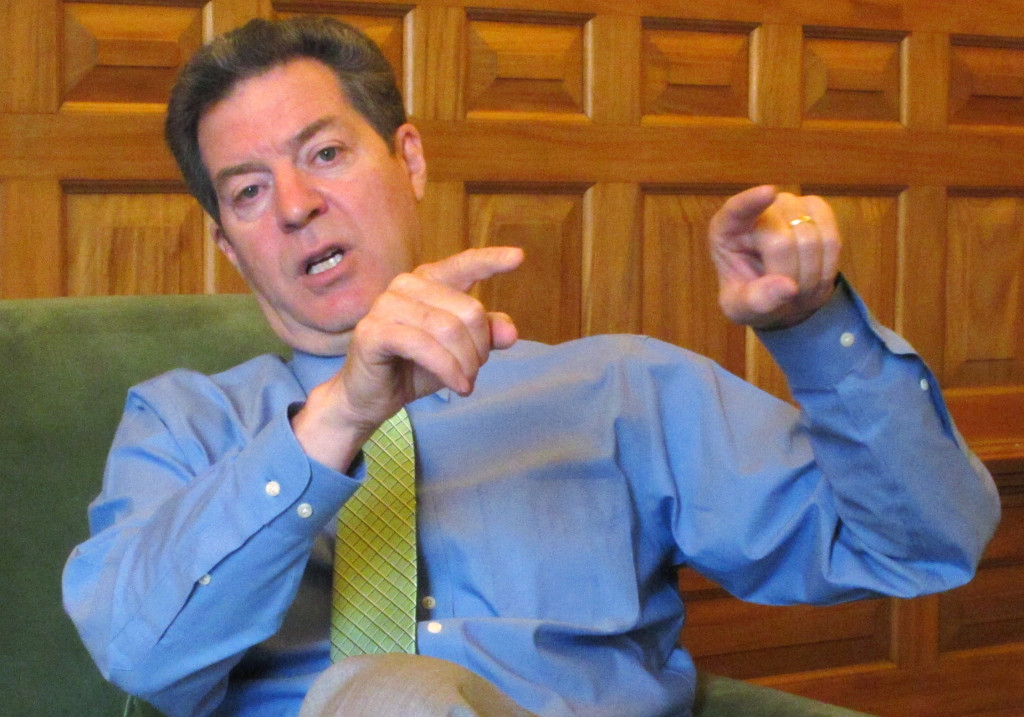
The rift between local government and Topeka grows.
Riley County commissioners were unified in their disappointment following Gov. Sam Brownback’s State of the State address Tuesday night.
Thursday morning, commissioner Robert Boyd — who’d met with Brownback to discuss local issues in recent months — led the charge.
“He obviously doesn’t need, want, desire our input or support,” Boyd said.
The biggest issue the commission had with the address was Brownback’s support of the state-imposed property tax lid, which would force counties and cities to hold an election on their respective budget if property taxes exceed the rate of inflation.
But local leaders say there are problems with that.
For one, the formula suggested to figure out if the that rate of inflation is exceeded has been an issue of confusion in exactly what variables are used and what is or isn’t exempt from it. Secondly, the time table for adding the question to an election ballot if that rate of inflation is exceeded — which it likely would be — is nothing short of a disaster for election clerks, who have various state statutes to follow when it comes to time-requirements in getting the question on a ballot. There’s also the timing of property valuations, which do not get back to counties from the state till June 15 and if the lid is to be imposed this year, would go into effect July 1.
Finally, there’s the question of the powers entrusted to the commissioners themselves, who are voted by the public to make such decisions that they will be accountable for during the next election cycle, anyway.
“I don’t understand the political rationale for the governor coming out and putting that in the State of the State speech,” Boyd said about Brownback’s support for the lid. “… he went out of his way to poke us in the eye, and that’s interesting.”
“People who don’t like what their city and county commissioners are doing there’s a process in place that’s in place for eons and it’s called the election process,” county clerk Rich Vargo said. “That’s how you correct it.”

Commissioner Ron Wells’ gripe with the lid has more to do with the body it came from.
“If you look at the sad state of the state of Kansas, the fact that they can’t operate their business, then turn around and then affect cities and counties — I think (they do that) out of frustration because they can’t take care of the state,” he said.
The state is again facing massive budget deficits — now $170 million in the red — and while property taxes have indeed been on the rise, local officials cite that cuts from the state have forced those increases as cities and counties continue to try and fund roads, police, fire fighters, schools and other basic services.
The Kansas Association of Realtors has been supportive of the tax lid and other Topeka initiatives, saying they believe voters should have the right to have a say in property tax rates.
The property tax lid was slipped into last year’s state budget bill hours before sunrise during the legislature’s record-breaking extended session that resulted in the largest tax increase in state history, done so largely through an increase in sales tax.
One lobbyist for the Kansas Association of Realtors told KMAN that the tax lid had 10 days of light in the legislature before that vote and indicated that was sufficient time for debate, fact-checking and gaining input from local government leaders — all while at the same time approving the overall state budget despite the fact the session lasted 23 more days than normally scheduled and at an increased costs to taxpayers.
It should also be noted that from 2004-2012, the Kansas Association of Realtors spent $602,585 on elections during that span, with 76 percent of those monies going to Republican campaigns and 23 percent going to Democrats.
KAR was also supportive of the mortgage registration fee repeal, which was a notable revenue generator for counties. The fee originally cost home-buyers relative pennies on the dollar throughout the term of their mortgage, but that was repealed by the legislature and signed by Brownback to be phased out starting in 2014.
The repeal added filing fees to recoup the loss for counties, but treasurers are saying it hasn’t been enough to make up for the loss and that the fees have been shifted to a larger swath of customers in the way of paper-filing costs.


